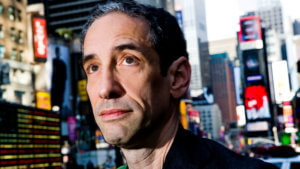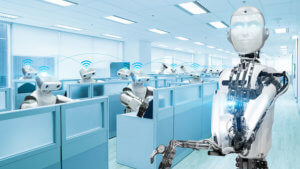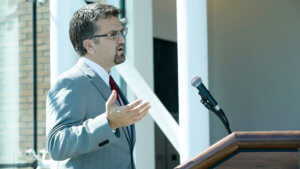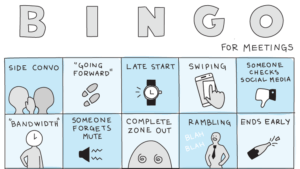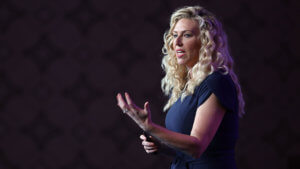Imagine receiving that communication from an alien civilization, neuroscientist and philosopher Sam Harris asked the listeners on an episode of TED Radio Hour. “Just imagine that.” And with the development of artificial intelligence, “that is the circumstance we are in, fundamentally,” said Harris, who attributed the alien civilization metaphor to computer scientist Stuart Russell, founder of the Center for Human-Compatible Artificial Intelligence at UC Berkeley. “We’re talking about the seeming inevitability that we will produce superhuman intelligence, intelligence which once it becomes superhuman, then it becomes the engine of its own improvement, and then there is a runaway effect — where we can’t even imagine how much better it could be than we are.”
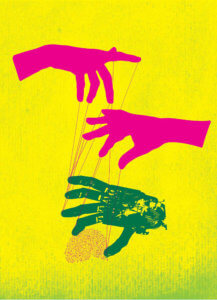
Illustration by Jerome Corgier
What especially worries Harris about artificial intelligence, he told host Guy Raz on the “Future Consequences” episode, recorded in 2017, “is that I’m freaked out by my inability to marshal the appropriate emotional response. Potentially, it’s the most worrisome future possible. Because we’re talking about the most powerful possible technology.”
While Harris’ 2016 TEDSummit talk, “Can We Build AI Without Losing Control Over It?” has had more than 4.3 million views, his fears are not universally shared. And our inability to react to this future with urgency, he says, poses a big problem.
Perhaps biomedical scientist Paul Knoepfler said it best earlier in the radio program: “Sometimes our technologies race ahead of our abilities to place them in a wise context and to know what to do or not to do with the technologies.”
When it comes to any discussion about the future of work, AI looms large. There are those who believe it will bring new opportunities and even a job boom — a recent Harvard Business Review article by three partners at McKinsey estimates that AI will add $13 trillion to the global economy over the next decade — and there are those in the camp who fear the robots are coming for our jobs.
One thing is certain: Change is upon us. Convene takes a look at what that means for the overall workplace in the next 10 years or so, and specifically, how to shift your thinking about your own skills set, because (spoiler alert) it’s what makes you human — your messy, emotional, caring, creative, problem-solving, sense-making, and relationship-building self — that experts say you need to lean more into for the coming years. It’s that kind of intelligence that no one is sure Silicon Valley will be able to replicate in AI. Yet.
CMP Series Required Reading
By reading the articles linked below as well as theThink:Act Magazine article, “The Future of Work Is a Matter of Being Human,” you can earn one hour of CE credit toward the CMP certification from the Events Industry Council. To earn certification clock hours, visit the CMP Series page to answer questions about information contained in this CMP Series article and the additional material.
The Certified Meeting Professional (CMP) is a registered trademark of the Events Industry Council.
Keeping the Future Human
We can’t stop technology, Douglas Rushkoff says, but in our rush to develop AI, we’re in danger of leaving behind the values we prize most as a society. Events have a role to play in addressing that.
Which Jobs Will Be Put at Risk by Automation?
The speed at which jobs will be automated in the future will have a lot to do with how easy — or how hard — it is to teach a machine the occupation’s job skills. Which jobs are most at risk?
You Can’t Automate Care
What began as a joke between two professors has grown into a movement to further the work of professionals “who keep our world from falling apart.”
Human Emotions Will Power the Future Workplace
You can’t just check your emotions at the door when you go to work, say the authors of a new book. And in the future, we’ll need to harness them even more in order to be collaborative and effective in the workplace.
In 2017, These Job Skills Topped a Forecast for 2020. How Do They Hold Up?
A lot has changed in the last five years, when the business website Inc. published a list of job skills pundits predicted would be critical in 2020. But, although we suggest a few tweaks, much of the advice is still relevant.
Will Automation Put Women Out of Work?
Experts say the gender issues that traditionally have impacted women more than their male counterparts could create even bigger barriers for them as all workers face changes in technology and automation.

